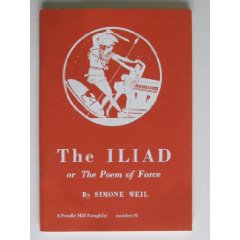"Simone Weil (3 February 1909 – 24 August 1943) was a French philosopher, Christian mystic, and political activist," (Wikipedia).
Below is an excerpt from Weil's 1939 essay, "The Iliad or the Poem of Force." Published in 2003 by Peter Lang Publishing Inc, New York. Translated by James P. Holoka. Pg. 53-54.
"The essay is about Homer's epic poem the Iliad and contains reflections on the conclusions one can draw from the epic regarding the nature of force in human affairs," (Wikipedia).
"Though all are destined from birth to endure violence, the realm of circumstances closes their minds to this truth. The strong is never perfectly strong nor the weak perfectly weak, but neither knows this. They believe they are of different species; the weak man does not consider himself like the strong, nor is he regarded as such. He who possesses force moves in a frictionless environment; nothing in the human matter around him puts an interval for reflection between impulse and action. Where reflection has no place, there is neither justice nor forethought: hence the ruthless and mindless behavior of warriors. Their sword plunges into a disarmed opponent at their knees; they vaunt over a dying man, telling him the insults his body will undergo. Achilles cuts the throats of twelve Trojan youths on the pyre of Patroclus as casually as we cut flowers for a grave. In wielding their power they never suspect that the consequences of their actions will afflict them in turn. When one can silence an old man with a word, cause him to tremble and submit, does such a one consider the curses of a priest to be of any consequence in the eyes of soothsayers? Does he forbear to appropriate the woman Achilles loves, knowing that neither has any choice but to submit? When Achilles delights to see the wretched Greeks flee, can he grasp that this flight, which will continue and end at his whim, will cost his friend and even himself their lives? Those to whom fate has loaned force perish through their over-reliance on it.Below is an excerpt from Secretary of Defense Chuck Hagel's article called, "The Limits Of Force" that was published in The Washington Post on September 3, 2009.
It is impossible that they should not perish, since they neither consider their own force to be limited nor recognize that their relations with others are a balance of unequal forces. Other men do not pause in their actions to have some regard for their fellow man; they conclude that destiny has granted them every license and none to their inferiors. From this point, they overstep the force at their disposal---inevitably, for they fail to see its limits. They are then surrendered ineluctably to chance, and things no longer obey them. Chance sometimes helps, sometimes hurts them; they are exposed quite naked to sorrow, without the armor of power that had shielded their spirit, with nothing to insulate them any longer from tears.
This geometrically stringent chastisement, which spontaneously punishes the abuse of force, was the primary issue in Greek thought. It constitutes the heart and soul of epic; under the name "Nemesis," it is the subject of Aeschylean tragedy; the Pythagoreans, Socrates, Plato move from this starting point to their reflections on man and the cosmos. The concept is familiar wherever the spirit of Greek thought has penetrated. This Greek idea perhaps survives as "karma" in regions of the East pervaded by Buddhism. But the West has lost it, lacking even a word for it in any of its languages. The notions of limit, measure, balance, which should shape the conduct of life, are employed only in a mundane way in the technical sphere. We are geometricians of mere matter; the Greeks were, from the outset, geometricians in the apprenticeship of virtue."
How, when and where we use force are as important as the decision to use it. Relying on the use of force as a centerpiece of our global strategy, as we have in recent years, is economically, strategically and politically unsustainable and will result in unnecessary tragedy -- especially for the men and women, and their families, who serve our country.
